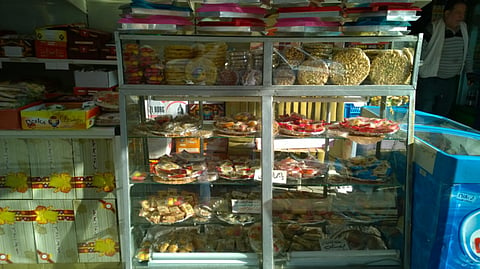Sweet taste to Prophet’s birthday celebrations in Egypt
Traditional festivities cut across communities

Cairo: Briskly arranging sweets outside his shop in the Old Cairo district of Al Sayeda Zeinb, Husni Halim is keen to showcase a wide variety of the delicacy especially made to celebrate Prophet Mohammad’s (PBUH) birthday, which falls next week.
“Mowlid Al Nabi [the Prophet’s birthday] is a big season for our business and we wait for it every year,” Halim says.
Historians say the special sweets were first introduced in Egypt by Fatimids, who ruled the country in the 10th century, and have since become a salient feature of celebrations marking the Prophet’s birthday in this mostly Muslim country.
“Like all other people in the pastry business, I prepare for this occasion at least three months in advance. I order my goods from a confectionery factory in the October 6 City known for its quality products,” Halim, 62, says, referring to an industrial zone on the outskirts of Cairo.
“Mowlid Al Nabi is a joyous occasion for all Egyptians — Muslims and Christians. They are keen not to miss the taste of sweets made for this holy occasion. There has been an increase in the number of Copts buying the Mowlid pastry since the ikhwan [Mulim Brotherhood] were toppled,” adds Halim, who says he has been in the business for more than 40 years.
In July 2013, the army deposed Islamist president Mohammad Mursi of the Muslim Brotherhood following massive street protests against his one-year rule.
Members of Egypt’s Christian minority are staunch backers of incumbent President Abdul Fattah Al Sissi, the former army chief who led Mursi’s ouster.
Christians have long complained about attacks by radical Islamists.
Mursi’s backers are accused of damaging and torching more than 40 churches in the unrest that followed his overthrow.
In recent years, tensions have flared at times between the country’s Muslims and Christians over disputes relating to sites of worship and conversions. Sometimes, they have triggered deadly violence.
The communal strains have significantly eased since Al Sissi took office in June.
“Christians and Muslims are brothers and partners in this country,” says Maria Nadi, a Christian mother of three, as she orders a box of the Mowlid sweets.
“Since my childhood, I have been fond of these sweets. Religion is for God and the nation is for all,” she adds, echoing a famous catchphrase usually uttered by moderate Egyptian clerics and politicians.
The popular Mowlid sweets are made with nuts, sesame and chickpeas.
Retail prices of the delicacy have increased by around 30 per cent this year compared to 2013, according to market observers.
“This is due to the rises in prices of imported ingredients, mainly hazelnuts, pistachios and almonds,” Salah Al Abd, the head of the pastry section at the Cairo Chamber of Commerce, said.
“This has negatively affected production levels and retail sales,” he added in press remarks.
Sweet vendors hope that sales will pick momentum in the days ahead of the festival that falls this year on January 3, according to the Islamic calendar.
“This is an annual tradition, which people are keen to preserve even in the worst economic circumstances,” says Mesbah Abdul Al Hai, an assistant at a confectionery shop in northern Cairo.
“It is true that the demand is not as high as in the past because of the [high] prices. But I’m confident the demand will increase in the coming few days. Also, we have boxes of sweets that suit all incomes.”
According to Al Hai, mixed sweets retail for 50 to 150 Egyptian pounds (Dh25-76) per kilo, depending on their nut-based stuffing.
“We have also a good variety of Mowlid dolls bought by husbands and fiances to offer as presents to their wives and fiancees on this occasion,” he adds. “These plastic dollars are imported from China and then are dressed in Egypt to look like a bride.”
The dolls sell for 20 to 100 Egyptian pounds, depending on the quality of their decorations, Al Hai says.
The plastic dolls replace the ones made of sugar, which have long been popular in Egypt as part of the Prophet’s birthday festivities.
“People stopped buying the candy doll for health reasons. It used to be exposed to pollution when put on display in shops,” Al Hai adds.


